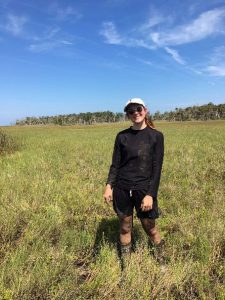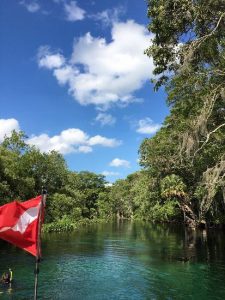Written by 2021 Summer Intern, Lisa DeFillips
 Truly grateful
Truly grateful
This summer I had the incredible opportunity to work with the Florida Department of Environmental Protection in Crystal River. I owe a tremendous thank you to Tim Jones, Trisha Green, and Meghan Gordon. This internship would not have been the same without these three remarkable people. Through each of them, I learned so much about seagrass and water quality monitoring, as well as the importance and excitement that comes along with fieldwork.

A beginner’s look into fieldwork
Through this internship, I not only learned various field and laboratory methods, but I also had the experience of a lifetime. Fieldwork is truly exhilarating, and the beauty of the Big Bend is absolutely breathtaking.
Because seagrass and water quality are critical components to the Big Bend ecosystems, seagrass and water quality monitoring are imperative. To ensure these ecosystems remain healthy, fieldwork is required. During this summer adventure, we would load up a boat with equipment, launch the boat, and depart for the day’s journey. Through the course of a day in the field, we would assess water quality using YSI multimeters to measure and record water temperature, pH, salinity, specific conductivity, and dissolved oxygen. Each of these is recorded and later used in data analysis. In addition, we also utilized grab samples for nutrient monitoring, harmful algal bloom monitoring, and microplastic analysis. During the seagrass portion of fieldwork, we used a modified Braun-Blanquet method to assess seagrass and algae communities. Through these assessments, we would determine the seagrass and algae abundance, the presence of epiphytes on seagrass blades, and sediment composition.
 Out of the water
Out of the water
Apart from days spent in the field, I used water collected through grab samples to identify microplastics. After water filtration using a vacuum pump, I would analyze the dried filters using a microscope to determine how many microplastics were present in each water sample. While investigating these slides are beyond fascinating, it is also extremely devastating to observe this issue first hand.
 Forever grateful
Forever grateful
This summer internship was truly an adventure where I explored the incredibly diverse habitats along the Nature Coast and learned about the importance of seagrass and water quality monitoring. Fieldwork was exciting, exhilarating, and eye-opening. To see and assess the variety of sites along the Big Bend was truly a rewarding and educational experience. Thank you again to the DEP, UF, and NCBS for the adventure of a lifetime.
 0
0
